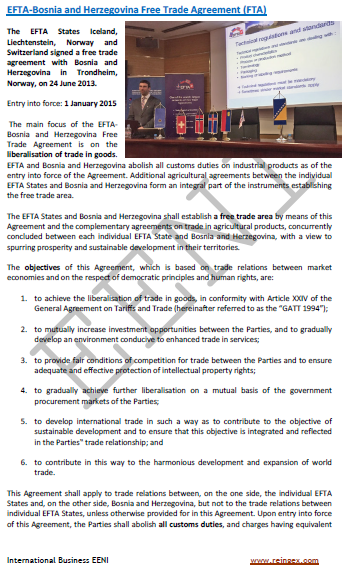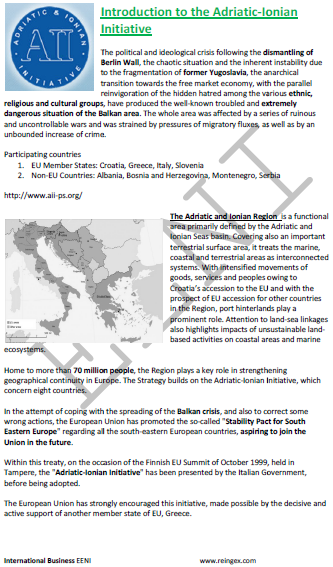Business in Bosnia and Herzegovina, Sarajevo. War

Bosnian-Herzegovinian Foreign Trade. Bosnia: a market economy
- Introduction to the Republic of Bosnia and Herzegovina (Central Europe)
- Bosnian-Herzegovinian Economy
- Business in Sarajevo
- Bosnian-Herzegovinian Foreign Trade
- Investment in Bosnia and Herzegovina
- Access to the Bosnian-Herzegovinian Market
- Business Plan for Bosnia and Herzegovina
Sample:
The objectives of the subject “International Trade and Business in” Bosnia and Herzegovina” are the following:
- To analyze the Bosnian-Herzegovinian Economy and Global Trade
- To know the trade opportunities in the Bosnian-Herzegovinian Market
- To analyze the trade relations of Bosnia and Herzegovina with the country of the student
- To know the Bosnia and Herzegovinian Trade Agreements
- To develop a business plan for the Bosnian-Herzegovinian Market

The Subject “Foreign Trade and Business in Bosnia and Herzegovina” belongs to the following Online Programs taught by EENI Global Business School:
Masters: International Business, Foreign Trade.
 Masters adapted to Bosnian and Herzegovinian Students.
Masters adapted to Bosnian and Herzegovinian Students.
Languages:  +
+  Bosnia-Herzegovina
Bosnia-Herzegovina  Bosnie-Herzegovine
Bosnie-Herzegovine  Bósnia e Herzegovina.
Bósnia e Herzegovina.
- Credits of the Subject “Doing Business in Bosnia and Herzegovina”: 1

- Duration: one week

International Trade and Business in Bosnia and Herzegovina

Bosnian-Herzegovinian Preferential Access and Trade Agreements:
- Bosnia and Herzegovina and the European Economic Area / Central Eurasia Economic Area
- Central European Free Trade Agreement (CEFTA)
- Turkey-Bosnia and Herzegovina Agreement
- Bulgaria-Bosnia and Herzegovina Agreement
- Bosnia and Herzegovina-EU Trade Relations;
- Stabilization and Accession Agreement with the EU
- Western Balkans
- EUROMED
- Islamic Trade Preferential System
- Central European Initiative
- Adriatic-Ionian Initiative
- Regional Cooperation Council

- WTO (in process of accession)
- WCO
- Convention Harmonization of Frontier Controls of Goods
- ICC
- COTIF Convention (Rail)
- BIC (Containers)
- Chicago Convention (ICAO)
- IMO
- Convention for Safe Containers
- Istanbul Convention
- IRU
- TIR Convention
- Guidelines on Safe Load Securing for Road Transport
- Customs Convention on Containers - not a member
- CIM / CIT Rules
Sample:

European Organizations:
- UNECE
- OSCE

- Islamic Development Bank (Beneficiary Country)
- OIC - Observer State
- Bosnia and Herzegovina is an observer country of the Standing Committee for Economic and Commercial Cooperation(COMCEC)
Global Organizations:
- UN
- WB
- WTO
- IMF

- Bosnian-Herzegovinian Capital: Sarajevo
- Official Languages of Bosnia and Herzegovina: Croatian, Bosnian and Serbian
- Area of Bosnia and Herzegovina: 51,197 km²
- Bosnian-Herzegovinian Population: 3.8 million people
- Type of Government of Bosnia and Herzegovina: Parliamentary Federal Republic
- Bosnia is a widely decentralized country, comprising two autonomous entities: The Federation of Bosnia and Herzegovina and the Republika Srpska, with a third region, the district of Brčko, governed by the local government
- Borders of Bosnia and Herzegovina: Croatia, Serbia and Montenegro
- Independence of Bosnia and Herzegovina: 1992 (Yugoslavia)
Main religions in Bosnia and Herzegovina:
-
Islam (50%)
- Bosnia and Herzegovina has not signed the Cairo Declaration on Human Rights in Islam
- Fiqh (Islamic Jurisprudence): Fiqh-al-Hanafi
- Christianity: Catholicism and Orthodoxy (30%)



Bosnia and Herzegovina belongs to the:
- Western Civilization (European Economic Area)
- Central Eurasia Economic Area
Economy of Bosnia and Herzegovina.
- The Republic of Bosnia and Herzegovina is one of the poorest countries of the former Yugoslavia and Europe; the devastating effects of the Bosnian war (1992-95) still endure. In addition, the long blockade of Serbia and Croatia further hampered the economic recovery
- Bosnia spend 5 billions of dollars at the end of the war to rebuild its battered economy
- Bosnia is becoming a market Economy
- Bosnian-Herzegovinian GDP (nominal): 49,874 million dollars
- GDP per capita of Bosnia and Herzegovina: 8,390 dollars
- Currency: Bosnia and Herzegovina convertible mark
- Main Bosnian products: fruit, tobacco, cattle, gold, copper, lead, zinc, coal
- In Sarajevo, there are tobacco, furniture, cars and communication equipment industries
- Main Bosnian companies: B & H Airlines, BH Telecom, Bosnalijek, Energopetrol, Factory of Tobacco of Sarajevo and Sarajevska Pivara (Sarajevo Brewery)

Bosnian-Herzegovinian Foreign Trade.
- Main Bosnian exports: metals, clothes, wood products
- Top Bosnian exports destinations: Slovenia (16%), Italy, Germany, Croatia, Austria, Turkey
- Main Bosnian imports: machinery, chemical products, fuels, food products
- Main suppliers of Bosnia: Croatia (19%), Germany, Slovenia, Italy, Austria
(c) EENI Global Business School (1995-2024)
We do not use cookies
Top of this page



